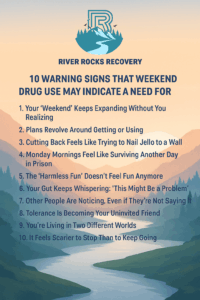When “Weekend-Only” Starts to Feel Like a Lie
At first, it probably felt harmless—just a way to unwind after a long week. Something to look forward to, a temporary relief valve. But lately, you might be noticing the weekends are creeping into Thursdays… and maybe even Mondays. That phrase “I only use on weekends” starts to feel like a lie you’re telling yourself. If you’ve ever thought, “At least I’m not using every day,” this one’s for you. Because you deserve more than white-knuckling it through the week just to “reward” yourself later.
1. Your “Weekend” Keeps Expanding Without You Realizing
What starts as Friday night can quickly bleed into Sunday afternoon. And before you know it, the weekend eats up your entire week. Maybe you wake up Monday still feeling foggy, anxiety-ridden, or physically spent. That expansion—the way your breaks become all day, all weekend, maybe even a week—signals something deeper. When your downtime becomes downtime with a drug, that’s worth pausing over.
Small, regular doses of rest keep you balanced. But when recovery time is paired with substances, the reset button stops working. Instead of recharging, you’re just patching the holes—and sometimes making them bigger.
2. Plans Revolve Around Getting or Using
Picture this: someone invites you to a brunch or gallery opening. Instead of thinking, “Sounds fun,” your first thought is, “Can I use there? Can I get some without drama?” You find yourself mentally calculating: Who’s there, will there be testing, can I – should I? If social plans feel more like logistics for using, that’s a red flag.
When substance use starts shaping your calendar, it means addiction—not pleasure—is running the show.
3. Cutting Back Feels Like Trying to Nail Jello to a Wall
You try sober weekends. You tell yourself, “No use for a month.” But then one thing happens—a stressful day, a fight, a craving—and you’re back at it. That cycle of resolve, slip, guilt, restart… it wears you down. Every time it happens, your brain fires up more resistance. True strength isn’t in starts—it’s in consistency. When consistency breaks, ask why.
4. Monday Mornings Feel Like Surviving Another Day in Prison
You might not be arrested, but if your Mondays feel like life sentences—exhausted, head pounding, body craving—you’re not just recovering from a hangover. You’re recovering from a cycle you didn’t choose. And that flood of fatigue? It doesn’t just hit your body—it hits your joy, clarity, ambition.
A life where Mondays aren’t endured starts with asking for help.
5. The “Harmless Fun” Doesn’t Feel Fun Anymore
There was a day when parties were thrilling and lights were vibrant. Maybe now they feel like a blurry sameness—confusing, anxious, disconnected. You go, you use, but the high doesn’t land. All it leaves is guilt. That hollow pit, where substance use is leftover from happiness—not the path to it—that’s a sign.
Your body and brain are telling you: this isn’t working anymore.
6. Your Gut Keeps Whispering: “This Might Be a Problem”
That voice—the one that says, “Hmm, maybe I’m not so fine”—holds deep wisdom. You wouldn’t be searching for answers if you didn’t already feel something shifting beneath the surface. When your gut checks in, don’t silence it. Validate it. Explore it. That moment of curiosity, that break in the story you tell yourself—that’s a doorway. You don’t have to hit a dramatic low to walk through it. You can just… walk.
7. Other People Are Noticing, Even If They’re Not Saying It
Sometimes the mirror is blurred, but others see the cracks. A friend might raise an eyebrow when you cancel plans. A parent might sound hesitant. They ask, “You sure you’re okay?” and you pretend you are. Subtle observations from those who care may feel annoying—but they’re often lifelines. You don’t have to answer to them, but you do deserve to hear yourself.

8. Tolerance Is Becoming Your Uninvited Friend
What used to do the trick doesn’t anymore. You need more—more quantity, more frequency, more intensity. When your body starts adapting, you’re not just chasing a feeling—you’re chasing survival. That’s the slippery slope where weekend exploration turns into weekend requirement. And tolerance is often the first step toward dependence.
9. You’re Living in Two Different Worlds
Picture your life as two calendars: Weekdays, you show up at work, manage responsibilities, lie to yourself that everything’s fine. Then there’s the weekend version of you—someone else entirely. Maybe louder. Maybe looser. It’s like switching roles depending on the day. Fragmented identities are exhausting. You deserve a life that feels like yours, all the time.
10. It Feels Scarier to Stop Than to Keep Going
When your heart races thinking about skipping your next weekend, or your stomach knots at the idea of getting through without a fix—that fear is significant. It means your brain isn’t just used to substances—it relies on them. That panic? It’s not weakness. It’s trauma entering the picture. And you don’t have to face that alone.
Why Even “Weekend Use” Can Need Supervision
A lot of people think rehab is only for extreme cases. But Drug Rehab Treatment in Middletown, Ohio exists along a spectrum. Whether you go 30, 60, or 90 days, or start with outpatient care, it’s about rewiring hidden pathways—without shame, without rock bottom. It’s about learning how to live where substance use doesn’t run the story—where you can reclaim energy, trust, joy.
A Metaphor to Carry With You
Imagine your internal thermostat: your natural rhythm of emotions, relationships, work, rest. Weekend use is like sticking tape over the dial. For a while, it seems fine—you don’t wake up freezing. But eventually, the warning blinks, and the system stops working right. Rehab doesn’t reset the thermostat—it gives back your access to the controls. It helps you push the dial without fear of freezing again.
Living Proof: A Story from Middletown
Alex, 24 (name changed), thought weekend use was under control. But he started noticing the weekends were stretching into weekdays, and his work focus felt like a distant memory. He locked himself into River Rocks Recovery’s 60‑day inpatient program near Middletown, Ohio. There, he built a schedule around wellness—not drugs. He learned to manage stress, reconnect with family, and find excitement in small things. Now, he’s working, dating, hitting the gym—free enough to feel curious again.
If Alex’s story could be yours, there’s a path waiting.
FAQs
1. Isn’t weekend use kind of normal?
A lot of people think so. But when that “routine” starts affecting health, relationships, or security—even subtly—it stops being casual. If substances are part of your “normal,” that’s worth examining.
2. Can I just try outpatient or outpatient therapy?
Absolutely. Not everyone needs inpatient care. River Rocks Recovery offers outpatient programs that let you stay connected to home and work while getting structured support.
3. Will people think I’m “weak” if I go to rehab?
Actually, vulnerability in admitting you’re stuck takes strength. You’re not weak—you’re curious about a different future. That curiosity is powerful.
4. What if I only use certain drugs on weekends?
The substance type doesn’t matter as much as its impact. Alcohol, stimulants, weed—if any drug is driving your emotional state or schedule, it deserves attention.
5. How much does rehab cost—and do they work?
Treatment costs vary, but investing in recovery often pays off. River Rocks Recovery works with many insurance plans and offers sliding-scale options. And yes, rehab works—especially when you step in before life stops you.
6. Can’t I just go to AA or NA instead?
Support groups are excellent—but they often work best alongside structured therapy. Rehab provides a toolkit: individual counseling, peer groups, medical support, life-skill rebuilding. It sets a foundation for long-term recovery.
Next Steps
If any part of this resonates—even a little bit—it’s okay to explore further. Pretend it’s just curiosity. Start with a phone call or visit. Learn what drug rehab treatment really looks like, without pressure. See therapists, staff, spaces. Notice how your body and mind respond when someone says, “We’re here without judgment.”
Call to Action
At River Rocks Recovery, we’ve seen how weekend use so often becomes a slow blur—one that people wake up from, shocked. You don’t have to wait until you can’t remember who you were. Rediscover calm mornings, clear days, honest connections. Call (888) 905‑6281 to learn more about our drug rehab treatment services in Middletown, Ohio.




























